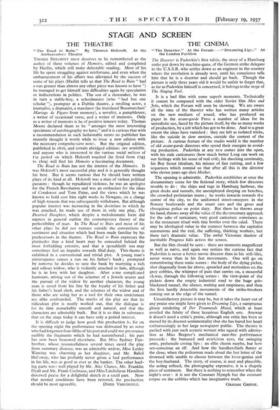STAGE AND SCREEN THOMAS HoLcaoFr most deserves to be remembered
as the author of three volumes of Memoirs, edited and completed
by Hazlitt, which still make delectable reading. Most of his life he spent struggling against misfortune, and even when the embarrassment of his affairs was alleviated by the success of
some of his plays (Hazlitt tells us that The Road to Ruin "had a run greater than almost any other piece was known to have ") he managed to get himself into difficulties again by speculation or indiscretions in politics. The son of a shoemaker, he was in turn a stable-boy, a schoolmaster (who "had but one
• scholar "), prompter at a Dublin theatre, a strolling actor, a journalist, a dramatist, a translator (he translated Beaumarchais'
• Manage de Figaro from memory), a novelist, a pamphleteer,
• a writer of occasional verse, and a writer of memoirs. Only as a writer of memoirs is he of positive interest today. Thomas Moore declared them to be "amongst the most interesting specimens of autobiography we have," and it is curious that with a recommendation in such fashionable terms no publisher has recently thought it worth while to issue a new edition with
the necessary comprehensive notes. But the original edition, published in 1816, and certain abridged editions are available, and anyone who is interested in the various social milieux of fie period on which Holcroft touched (he lived from 1745 to 1809) will find his Memoirs a fascinating document.
The Road to Ruin has not the interest of the Memoirs. It was Holcroft's most successful play and it is generally thought his best. But it seems curious that he should have written plays of its kind at all. Holcroft was a man of violent political
• passions.: though he repudiated violence, he was an apologist for the French Revolution and was an enthusiast for the ideas . of -Condorcet and Tom Paine, and the views which he was known to hold cost him eight weeks in Newgate, on a charge of high treason that was subsequently withdrawn. But although popular interest was increasing in the doctrines to which he
was attached, he made use of them in only one play, The Deserted Daughter, which despite a melodramatic form did express in general outline the contemporary theory of the perfectibility of man. In The Road to Ruin and most of his
other plays he did not venture outside the conventions of sentiment and situation which had been made familiar by his
predecessors in the theatre. The Road to Ruin expresses the
platitudes that a kind heart may be concealed behind the most forbidding exterior, and that a spendthrift son may sometimes feel an impulse towards filial duty. This theme is exhibited in a conventional and trivial plot. A young man's extravagance causes a run on his father's bank ; prompted by remorse he decides to save the bank by marrying a rich and odious widow, who is violently attached to him, although he is in love with her daughter. After scme complicated humours, arising out of the schemes of a Jewish usurer and the pursuit of the widow by another character, the young man is saved from his fate by the loyalty of his father and his father's head clerk, and the schemes of the widow and of those who are using her as a tool for their own enrichment are alike confounded. The merits of the play are that its ridiculous plot is neatly worked out, that the dialogue is for its time remarkably smooth and natural, and that the characters are admirably built. But it is so thin in substance that on the stage today it can have only a period interest.
It is difficult to judge how good this production is, for on the opening night the performance was dislocated by an actor who had forgotten four-fifths of his part and could not pronounce audibly the fragments which he had remembered ; his part has now been bestowed elsewhere. But Miss Sydney Fair- brother, whose resourcefulness several times saved the play from summary disaster, was an admirable widow, Miss Lesley Wareing was charming as her daughter, and Mr. Baliol Hol'oway, who has probably never given a bad performance in his life, was as good as ever as the banker. The other lead- ing parts wer.: well played by Mr. Alec Clunes, Mr. Franklin Dyall and Mr. Frank Cochrane, and Miss Lindisfarne Hamilton deserved praise for a delightful sketch in a small part. Now that normal conditions have been restored, the production














































 Previous page
Previous page